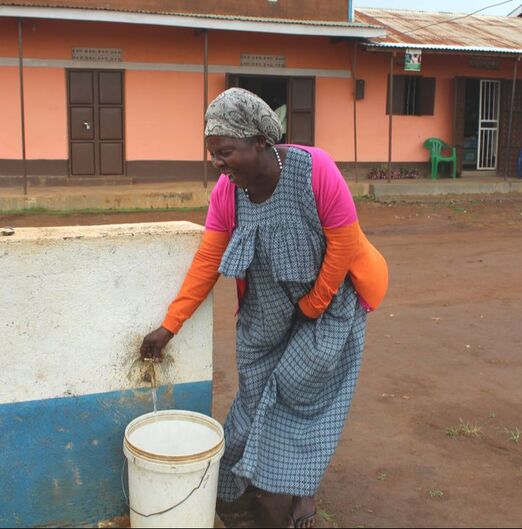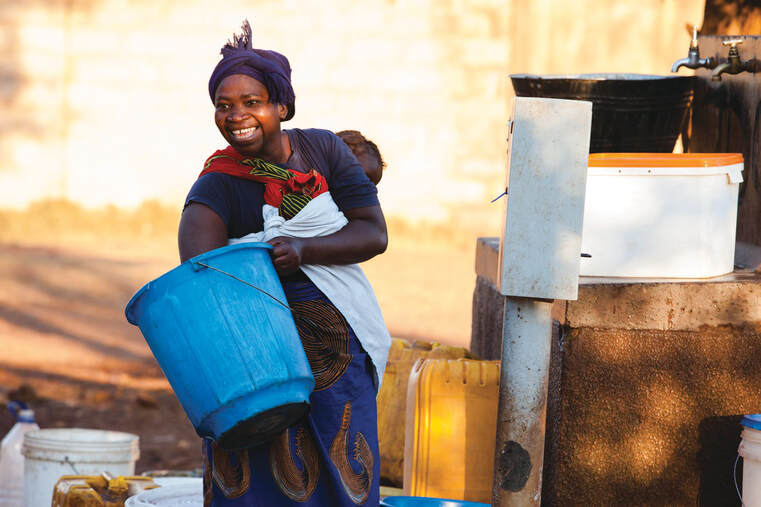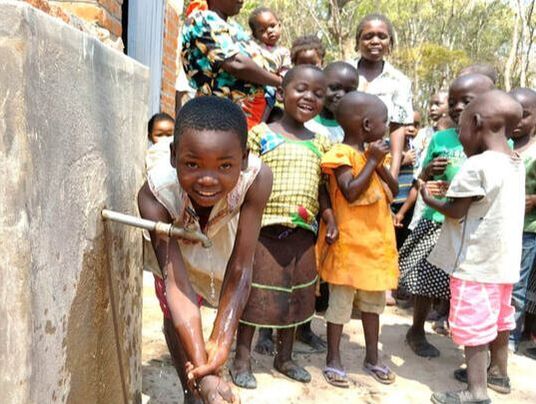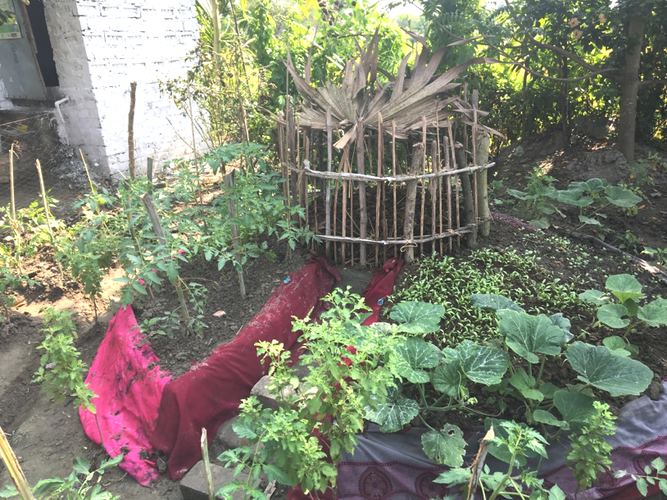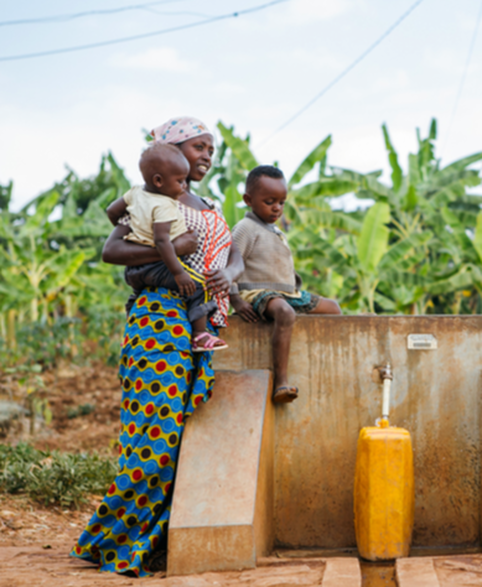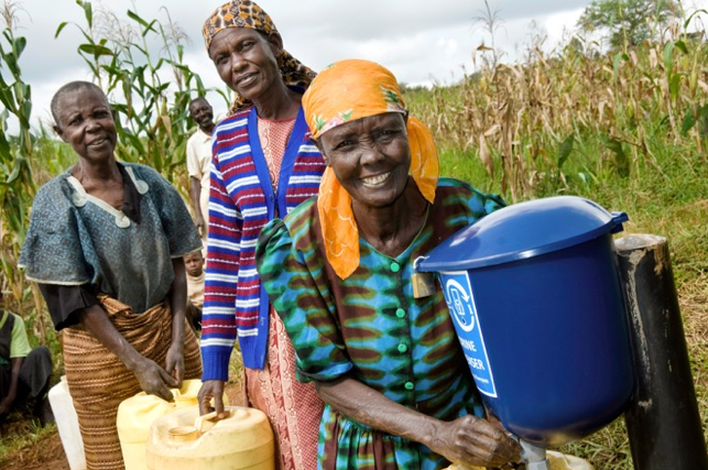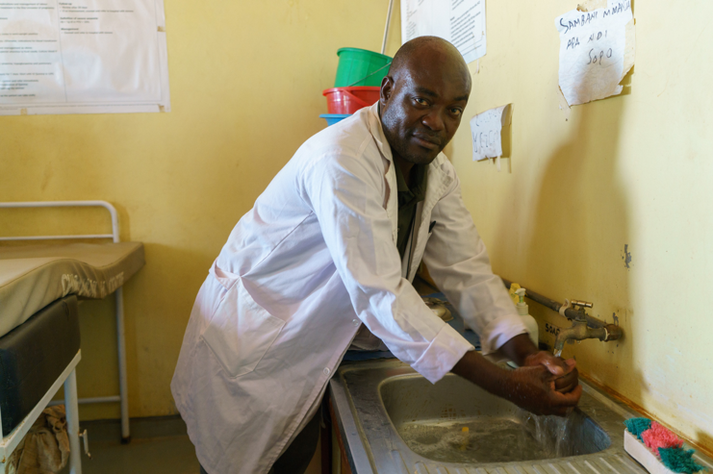Water, Sanitation and Hygiene
Current portfolio
In this region of Uganda, around a third of households have no access to any sanitation facility, and hygiene facilities at schools and healthcare centres are very limited. IRC WASH have been working in this region of Uganda since 2010. They take a long-term, district-wide approach to their work. Their goal is to strengthen the planning and implementation of local systems supporting sanitation and hygiene, promote private sector support and create opportunities for the innovations necessary to reach universal WASH coverage.
The objective of the grant is to improve local water systems providing sanitation and hygiene to schools, healthcare centres and communities. This is expected to contribute to reduced rates of diarrhoea, lower risk of infection at health centres and improved school attendance. The project will also support the private sector to expand waste management businesses.
Through this three-year project, IRC WASH aim to:
The objective of the grant is to improve local water systems providing sanitation and hygiene to schools, healthcare centres and communities. This is expected to contribute to reduced rates of diarrhoea, lower risk of infection at health centres and improved school attendance. The project will also support the private sector to expand waste management businesses.
Through this three-year project, IRC WASH aim to:
- Provide seven health care facilities with access to appropriate water, sanitation and hygiene facilities serving 160,740 patients and staff
- Provide 8,710 learners in eight schools with access to safe drinking water and hand washing with soap facilities
- Provide 17,450 household members with access to improved water and sanitation facilities
- Extend five kilometres of piped water to six primary schools and four healthcare facilities
- Train 60 sanitation and hygiene technicians on waste management and recycling
Over 65% of Lusaka’s 2.5 million population live in low-income, informal, peri-urban areas (PUAs). Rapid urban population growth has left many residents in these areas with extremely limited access to basic services. The current water network is unable to meet demand, leaving many residents with no supply at all. The poor quality of the water available to residents leads to frequent outbreaks of water-related diseases such as typhoid, diarrhoea, dysentery and cholera.
Water and Sanitation for the Urban Poor (WSUP) aim to improve safe water and sanitation access as well as hygiene practices in urban and peri-urban areas. We have awarded them a three year grant to support the government-mandated water utility and a local water trust to improve the water supply in Chazanga, a peri-urban area within the city of Lusaka. Activities will include:
Through this project, WSUP aim to ensure that:
Water and Sanitation for the Urban Poor (WSUP) aim to improve safe water and sanitation access as well as hygiene practices in urban and peri-urban areas. We have awarded them a three year grant to support the government-mandated water utility and a local water trust to improve the water supply in Chazanga, a peri-urban area within the city of Lusaka. Activities will include:
- Increasing the water supply by drilling a commercial borehole, and by installing and/or rehabilitating a water storage tank.
- Reducing water losses by repairing infrastructure and introducing more effective leak detection and water pressure management.
- Improving access to the water supply by expanding the network, installing pre-paid dispensers and improving water quality testing.
- Building the capacity of the local service providers to ensure the financial sustainability of operations and future investment in capital projects.
Through this project, WSUP aim to ensure that:
- 50,000 Chazanga residents gain access to the formal water supply.
- 30,000 Chazanga residents benefit from increased water availability.
- Water losses are reduced by at least 10%.
- The local service provider has the capacity to generate sufficient revenue to sustain improvements and expand the network to reach new customers.
Completed projects
This project provided under-fives in the Mchinji District of Malawi a chance to reach their full potential by promoting safe environments in which to learn, grow and thrive. Using 15 pre-schools as an entry point, Pump Aid engaged with local communities to provide sustainable WASH facilities, build capacity to improve feeding, reduce illness and promote stimulating learning environments for young children. Activities included:
This project achieved:
- Construction of waterpoints, latrines and handwashing stations in 15 pre-schools.
- Operations and maintenance training for members of the pre-school management committees.
- Development of income generation plans to cover the cost of maintaining the facilities built as part of this project, but also for resources and improvements to the pre-school.
- Training caregivers and frontline health workers on hygiene behaviour and nutrition.
- Establishing kitchen gardens at each pre-school and at 6 larger plots. Crops will be used to provide nutritious meals to pre-school students and sold for income generation.
- Forming Women’s Task forces who will provide peer-to-peer education on health and nutrition and conduct marketing activities to promote improved water and sanitation technologies.
This project achieved:
- Reduced the percentage of Under-5s at the target pre-schools suffering from diarrhoea from 27% to 4%.
- Improve attendance at the target preschools by 54%.
- Increase the percentage of target Under-5s washing their hands at critical times from 25% to 70%.
- Increase the percentage of households in the surrounding communities with access to increased sanitation from 50% to 61%.
34% of rural children under five years-old in West Bengal suffer from stunting, 22% from wasting and 25% of women of reproductive age have a body mass index (BMI) below the recommended cut-off value of 18.5 kg/m2.
For drinking water, the population of the Canning-II Block in the South 24 Parganas district of West Bengal depends on a limited number of shallow tube wells. These tube wells are often poorly located, requiring villagers (mostly women and girls) to walk up to 2 kilometres to reach them. This amounts to an average round trip of 45 - 60 minutes during normal weather conditions. In addition, existing tube wells draw water from the upper aquifer which is generally saline and unfit for consumption. Many of the existing tube wells are constructed without raised platforms to protect them during floods, thus increasing the risk of contamination and often limiting access. Poor access to safe drinking water and sanitation, together with inadequate dietary intake, result in recurrent illnesses, in particular waterborne diseases such as diarrhoea. During the baseline assessment performed at the start of the project, Terre des hommes learned that 27.3% of under five children in the target area had suffered from diarrhoea in the previous two week period.
Terre des hommes have improved mother and child health in the flood-prone Canning-II Block of West Bengal by enhancing water, sanitation and hygiene (WASH), nutrition and health care practices. Key activities included (i) supporting the construction of 280 keyhole gardens, (ii) constructing 30 communal tubewells with platforms raised above the maximum flood level and 250 Ecological sanitation toilets; and (iii) improving hygiene and infant feeding practices through Participatory Learning Action. Despite the considerable challenges caused by Covid-19 and storms, all of the construction targets were met, providing quality, long-lasting access to water and sanitation that will serve the community for years to come.
This project achieved:
For drinking water, the population of the Canning-II Block in the South 24 Parganas district of West Bengal depends on a limited number of shallow tube wells. These tube wells are often poorly located, requiring villagers (mostly women and girls) to walk up to 2 kilometres to reach them. This amounts to an average round trip of 45 - 60 minutes during normal weather conditions. In addition, existing tube wells draw water from the upper aquifer which is generally saline and unfit for consumption. Many of the existing tube wells are constructed without raised platforms to protect them during floods, thus increasing the risk of contamination and often limiting access. Poor access to safe drinking water and sanitation, together with inadequate dietary intake, result in recurrent illnesses, in particular waterborne diseases such as diarrhoea. During the baseline assessment performed at the start of the project, Terre des hommes learned that 27.3% of under five children in the target area had suffered from diarrhoea in the previous two week period.
Terre des hommes have improved mother and child health in the flood-prone Canning-II Block of West Bengal by enhancing water, sanitation and hygiene (WASH), nutrition and health care practices. Key activities included (i) supporting the construction of 280 keyhole gardens, (ii) constructing 30 communal tubewells with platforms raised above the maximum flood level and 250 Ecological sanitation toilets; and (iii) improving hygiene and infant feeding practices through Participatory Learning Action. Despite the considerable challenges caused by Covid-19 and storms, all of the construction targets were met, providing quality, long-lasting access to water and sanitation that will serve the community for years to come.
This project achieved:
- 100% of tube wells functional, reliably delivering water and maintained by local users paying fees
- 52% of population now have access to improved drinking water sources in all weather conditions, from a baseline of 8%
- 9% reduction in percentage of under-fives with low weight–for-age (target 10%)
- 80% of households with a new keyhole garden have improved nutrition
Through their impact model known as 'Everyone Forever', Water For People aim to reach Everyone in a district; providing reliable water and sanitation services for every family, clinic, and school. To ensure water and sanitation services are sustainable, Water For People builds capacity in communities, service providers and governments to invest in appropriate long-term water and sanitation solutions.
According to the Joint Monitoring Programme, only 57% of Rwandans have a basic level of service for drinking water, while an estimated 62% have basic sanitation services, demonstrating a genuine need to invest in water and sanitation. Water For People has been working in Rwanda since 2008 and currently implements the Everyone Forever model in three Rwandan districts.
During this project the following results were achieved:
According to the Joint Monitoring Programme, only 57% of Rwandans have a basic level of service for drinking water, while an estimated 62% have basic sanitation services, demonstrating a genuine need to invest in water and sanitation. Water For People has been working in Rwanda since 2008 and currently implements the Everyone Forever model in three Rwandan districts.
During this project the following results were achieved:
- Kicukiro district achieved the 'Everyone' milestone for water at the community level, meaning that every community has reliable water access.
- Two 'Everyone' milestones for water in public institutions were achieved in both Kicukiro and Rulindo districts, meaning that all schools and clinics in these two districts now have reliable water access.
- Water For People completed 70 water systems for communities in Rulindo, Gicumbi, and Karongi districts, reaching 176,576 people.
- Water, sanitation and hygiene infrastructure was completed in 95 schools, including connections to the piped water supply, sanitation facilities, rainwater harvesting systems, handwashing stations, and facilities for improved menstrual hygiene.
Evidence Action take evidence-backed cost-effective development interventions to scale, working to turn successful trials into sustainable large-scale organisations. We were asked to contribute to one of their main programmes: Dispensers for Safe Water.
Diarrhoeal diseases are among the leading causes of under-5 mortality. Safe drinking water is widely accepted as a key intervention in the prevention of diarrhoea. Dispensers for Safe Water treat water with chlorine: a proven, low- cost water treatment solution. The programme consists of three components: (1) installation of chlorine dispensers directly at local water sources; (2) working with local community promoters who market, maintain, and refill the dispensers; and (3) overseeing a locally-staffed delivery and repair supply chain.
The Malawi programme started as a small pilot in the Zomba District in 2013 and now serves 652,073 people through 3,772 confirmed chlorine dispensers, covering 99% of the Zomba District. Evidence Action have achieved and maintained a remarkably high chlorine adoption rate of over 80% among its Malawian beneficiaries.
The Charity’s grant was used for: (i) continued chlorine procurement and delivery, (ii) dispenser maintenance and repair, (iii) training/retraining promoters and government Health Surveillance Agents (who conduct community education, chlorine stock control and provide feedback to Evidence Action in the event of dispenser breakdowns/damage), (iv) mobilisation of the community to maintain the high adoption rate and (v) generation of carbon finance.
Thanks to this project:
Diarrhoeal diseases are among the leading causes of under-5 mortality. Safe drinking water is widely accepted as a key intervention in the prevention of diarrhoea. Dispensers for Safe Water treat water with chlorine: a proven, low- cost water treatment solution. The programme consists of three components: (1) installation of chlorine dispensers directly at local water sources; (2) working with local community promoters who market, maintain, and refill the dispensers; and (3) overseeing a locally-staffed delivery and repair supply chain.
The Malawi programme started as a small pilot in the Zomba District in 2013 and now serves 652,073 people through 3,772 confirmed chlorine dispensers, covering 99% of the Zomba District. Evidence Action have achieved and maintained a remarkably high chlorine adoption rate of over 80% among its Malawian beneficiaries.
The Charity’s grant was used for: (i) continued chlorine procurement and delivery, (ii) dispenser maintenance and repair, (iii) training/retraining promoters and government Health Surveillance Agents (who conduct community education, chlorine stock control and provide feedback to Evidence Action in the event of dispenser breakdowns/damage), (iv) mobilisation of the community to maintain the high adoption rate and (v) generation of carbon finance.
Thanks to this project:
- The percentage of under-5 children reported to have had diarrhoea in the previous two weeks has reduced from the pre-programme baseline of 13.6% to 5.5%.
- The percentage of households with chlorine residual in household drinking water during unannounced visits has increased from the pre-programme baseline of 1% to 77%.
According to WaterAid only 25% of health clinics in Malawi have access to clean water, 8% have no toilets at all and 54% do not have waste receptacles. As a result, clinics are not hygienic and midwives are unable to wash their hands between deliveries, increasing the risk of bacterial infections, often fatal for mothers and newborns. This project focussed on delivering water, sanitation and hygiene (WASH) interventions to health clinics and communities in the Nkhotakota, Kasungu and Machinga districts of Malawi.
Thanks to this project:
Thanks to this project:
- 16 health facilities have improved, inclusive WASH facilities.
- Over 600 community facilitators and health facility staff were trained on WASH and Mother and Newborn Health.
- 98% of women in the target areas gave birth at health centres (vs 91% before the project began)
- 43,764 people gained access to sustainable and inclusive WASH services.
- Close to 200,000 people were reached with hygiene promotion activities. This was lower than expected but WaterAid are continuing their hygiene work in the target areas.
James Percy Foundation
Registered with the Charity Commission 1144494
Registered with the Charity Commission 1144494

